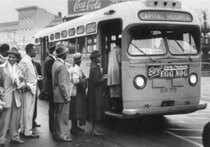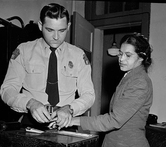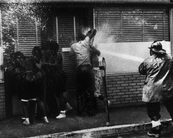-
Voici les meilleurs travaux d'expression écrite sur la séquence faite sur l'histoire afro-américaine. Les élèves travaillaient en salle informatique sans accès au cahier et ils exprimaient leurs connaissances sur les images de la fiche.
Voici quelques présentations orales des troisièmes euros sur deux sujets étudiés en classe : l'histoire de Rosa Parks et le boycott des bus à Montgomery, Alabama en 1956 ; les manifestations violentes à Birmingham, Alabama, en 1963. Les présentations ont été préparées par les élèves eux-mêmes à partir des notes prises en classe regardant des vidéos. Ils parlaient seulement à l'aide de quelques images qui guidaient leur présentation mais n'avaient pas le droit de lire un texte préparé à l'écrit.
Rosa Parks and the Montgomery Bus Boycott



Listen to Tiphaine telling the story
Listen to Théo telling the story
Martin Luther King and the Civil Rights demonstrations in Birmingham, Alabama



Listen to Elodie telling the story
Listen to Charlotte telling the story
Listen to Tom telling the story
-
Here are the three songs I spoke to you about in our last lesson
1. Sam Cooke's "A change is gonna come" which inspired Barack Obama's election announcement "A change has come to America"
2. Bob Marley's "Buffalo soldier". Buffalo soldiers were the African Americans who fought with the Unionist Army in the American Civil War.
3. And finally Billie Holiday's poignant "Strange Fruit". The photos are real photos, I'm afraid. They are not from films.
-
A) Here is the video of our Italian friends' school. Write a paragraph about it by answering the 12 questions here.
1. Where is the school ?
2. How many pupils are there ?
3. What time do the students start school and what time do they finish ?
4. Do they go to school every day ?
5. Have they got a big canteen ? Compare it to our canteen.
6. When can they eat in the canteen ?
7. How many computers are there in the computer room ?
8. How many computer rooms have they got ?
9. When is the library open ?
10. What have the teachers got in the staff room ?
11. What have they got (that we haven't got!) ?
12. What sports do they play ?
B) Now listen to this presentation of a different school and do the work on the sheet "Oral Comprehension : Presenting a school". Click on the link here
Télécharger « School Presentation Oral Comprehension »
-
Teste ta compréhension orale en jouant à "Who is who?". Clique sur le lien pour y accéder.
-
Essayez de faire le puzzle en choisissant entre AM, ARE, IS, HAVE GOT, et HAS GOT pour compléter chaque phrase. Un peu de vocabulaire pour vous aider :
"freckles" (nom) = tâches de rousseur
"pony tail" (nom composé) = queue de cheval
"bun" (nom) = chignon
"weak" (adj) = faible
"thin" (adj) = mince
Cliquez sur le lien pour accéder au jeu.
 Suivre le flux RSS des articles
Suivre le flux RSS des articles Suivre le flux RSS des commentaires
Suivre le flux RSS des commentaires
Collège Jacques Prévert - Les Arcs sur Argens -



